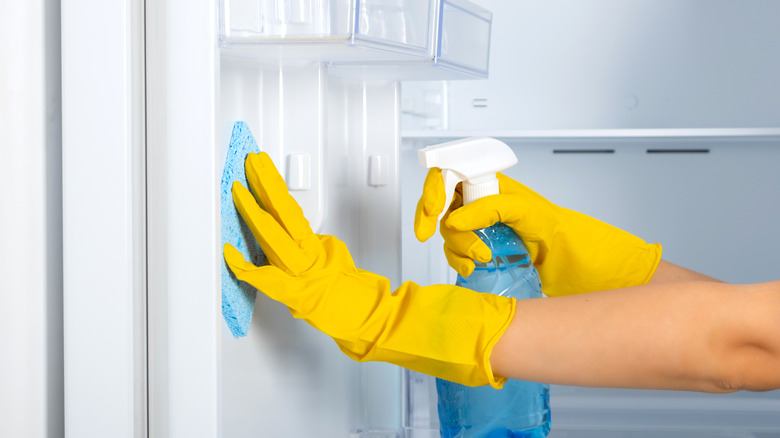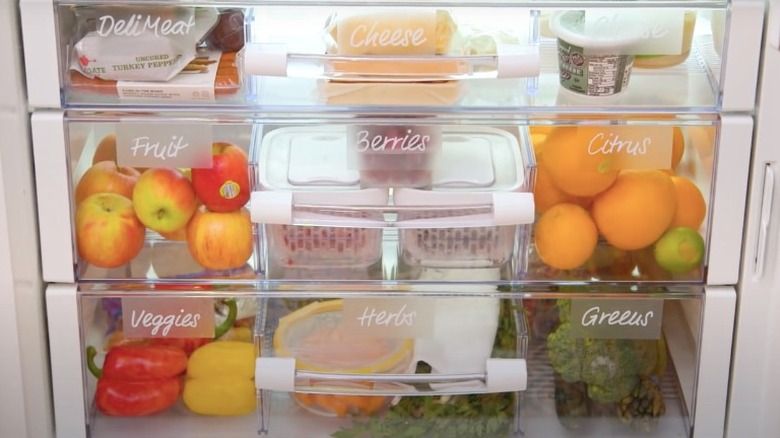How Often Should You Be Cleaning Your Fridge?
We rely on our refrigerators to preserve everything from our most recent groceries to those restaurant leftovers that — if we're being realistic — we'll probably never get around to. Once containers are buried behind ripening fruit and dairy products, it's easy to lose track of what we have in stock. According to a recent story by ADDitude, sometimes we even forget items in our fridges that are anything but edible. One reader shared, "I left my phone in the refrigerator last night. I only found it because my watch can ping my phone." Another reflected, "I lose my wallet, the remote control, and my glasses several times a day. I always check the laundry and fridge first."
Though they're certainly a convenient aspect of modern technology, it's important to remember that refrigerators have their limits. Always check expiration dates and place those leftovers front and center so as not to let them stink up the back shelves. Even at 40 degrees Fahrenheit, food can go bad. The moment you notice a stench, it's important to address the issue. However, even if there's not a discernible spill or smell, you should be cleaning your fridge on a somewhat regular basis.
Deep clean your fridge every season
According to GQ, it's best to deep clean your refrigerator every three to four months of the year. In other words, go through your fridge at the end of each season to determine what can be discarded — that half-empty container of yogurt, for instance, or the leftover sandwich from lunch last week. Considering it's an area where food is stored, a refrigerator is not the place to let a passion for hoarding shine through. Messy appliances can be a sanitary risk, and so should always be treated with care.
According to the U.S. Food and Drug Administration, potentially dangerous microorganisms like Salmonella and E. Coli can develop in appliances that aren't properly maintained, causing food-borne illnesses. Mayo Clinic recommends tossing leftovers after three to four days — aka the point when germs usually start to develop. Place expired items in zip lock bags to prevent trash from leaking. Goods that you're particularly attached to can be safely preserved for much longer in the freezer.
When deep cleaning your appliance, it's helpful to first unplug it (via The Home Depot). This way, you won't waste electricity while sorting and sanitizing. The Home Depot also recommends switching off the circuit breaker that connects to the fridge if you can't access the outlet. From here, go through the process of properly emptying and cleaning your refrigerator. Remove all food items and detachable shelving, prepping a cooler to keep products chilled during the process. When reorganizing your fridge, make sure all items are in view and easily accessible. If you're left with a lingering smell, it can be helpful to place a small, open container of baking soda in the fridge to soak up any stubborn stenches.
Make the time for weekly wipe downs
While deep cleaning is certainly not necessary every week, it's best to do smaller wipe downs more regularly, especially if you notice there's a problem. CNET notes that spills should be addressed immediately, preventing bacteria from building up in potentially hazardous places. Remember to do a weekly checkup on items prone to spoilage like dairy products — yes, you may need to sniff cartons of sour milk every once in a while. Unsure of whether an item is still okay to eat? The U.S. Department of Agriculture (USDA) put together a guide for determining food safety, addressing concerns regarding date-labeling phrases. It's also important to stay updated on items that have been recalled, throwing away products you've stored next to them as well, per the Centers for Disease Control and Prevention.
As a general rule, when in doubt, throw it out. It's better to be safe than doubled over with food poisoning. According to the U.S. Food and Drug Administration, refrigerators should be kept at 40 degrees Fahrenheit (or lower). Due to the potential risks, keep an eye on the temperature gauge in your fridge and adjust it when necessary. It's also important not to neglect your refrigerator's handles and doors — these too should be disinfected. CNET recommends using an antibacterial wipe to clean them off daily.


